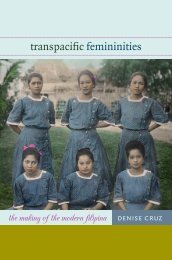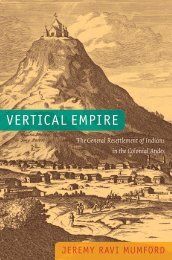Spring 2013 Catalog - Duke University Press
Spring 2013 Catalog - Duke University Press
Spring 2013 Catalog - Duke University Press
Create successful ePaper yourself
Turn your PDF publications into a flip-book with our unique Google optimized e-Paper software.
Impossible Citizens<br />
Dubai’s Indian Diaspora<br />
neha vora<br />
“Neha Vora’s Impossible Citizens is not only a fine ethnography of the<br />
‘permanently temporary’ Indian population in Dubai, it is also a searching<br />
re-examination of concepts such as ‘citizenship,’ ‘diaspora,’ and ‘democ-<br />
racy.’ In the finest traditions of ethnographic work, Vora thoroughly under-<br />
mines the usual scholarly use of these concepts by showing how little ana-<br />
lytic purchase they give us in one case. She argues instead for a view in<br />
which migrants are not separated from citizens, and the economic causes<br />
of migration are not seen as disconnected from questions of social and<br />
cultural citizenship. Theoretically innovative and ethnographically rich, this<br />
study will be a necessary guide to modes of belonging in the contempo-<br />
rary globalized world.”—AKHIL GUPTA, author of Red Tape: Bureaucracy,<br />
Structural Violence, and Poverty in India<br />
Indian communities have existed in<br />
the Gulf emirate of Dubai for more<br />
than a century. Since the 1970s,<br />
workers from South Asia have flooded<br />
into the emirate, enabling Dubai’s<br />
huge construction boom. They now<br />
comprise its largest noncitizen population.<br />
Though many migrant families<br />
are middle-class and second-, third-,<br />
or even fourth-generation residents,<br />
Indians cannot become legal citizens<br />
of the United Arab Emirates. Instead,<br />
they are all classified as temporary<br />
guest workers. In Impossible Citizens,<br />
Neha Vora draws on her ethnographic research in Dubai’s Indiandominated<br />
downtown to explore how Indians live suspended in a state<br />
of permanent temporariness.<br />
While their legal status defines them as perpetual outsiders, Indians are<br />
integral to the Emirati nation-state and its economy. At the same time,<br />
Indians—even those who have established thriving diasporic neighborhoods<br />
in the emirate—disavow any interest in formally belonging to<br />
Dubai and instead consider India their home. Vora shows how these<br />
multiple and conflicting logics of citizenship and belonging contribute<br />
to new understandings of contemporary citizenship, migration, and<br />
national identity, ones that differ from liberal democratic models and<br />
that highlight how Indians, rather than Emiratis, are the quintessential—<br />
yet impossible—citizens of Dubai.<br />
Neha Vora is Assistant Professor of Anthropology at Lafayette College<br />
in Easton, Pennsylvania.<br />
ANTHROPOLOGY/MIDDLE EAST STUDIES/SOUTH ASIAN STUDIES<br />
March 264 pages, 14 illustrations<br />
paper, 978–0–8223–5393–5, $24.95/£16.99<br />
cloth, 978–0–8223–5378–2, $89.95/£67.00<br />
anthropology<br />
Transforming the Frontier<br />
Peace Parks and the Politics of Neoliberal<br />
Conservation in Southern Africa<br />
bram büscher<br />
“Bram Büscher offers an original approach to conceptualizing and examining<br />
neoliberal modes of government in action. He uses a richly grounded<br />
empirical analysis to shed light on a key puzzle with important political<br />
stakes: How are implausible win-win scenarios sustained despite their<br />
manifold contradictions, and what kinds of critical work are needed to<br />
puncture them? An excellent read.”—TANIA MURRAY LI, author of The<br />
Will to Improve: Governmentality, Development, and the Practice of Politics<br />
transforming<br />
the frontier<br />
Peace Parks and the Politics of neoliBeral<br />
conservation in southern africa<br />
International peace parks—transnational<br />
conservation areas established<br />
and managed by two or more countries—have<br />
become a popular way<br />
of protecting biodiversity while promoting<br />
international cooperation and<br />
regional development. In Transforming<br />
the Frontier, Bram Büscher shows<br />
how cross-border conservation neatly<br />
reflects the neoliberal political<br />
economy in which it developed.<br />
Bram Büscher Based on extensive research in<br />
southern Africa with the Maloti-<br />
Drakensberg Transfrontier Conservation and Development Project,<br />
Büscher explains how the successful promotion of transfrontier conservation<br />
as a “win-win” solution happens not only in spite of troubling<br />
contradictions and problems, but indeed because of them. This is what<br />
he refers to as the “politics of neoliberal conservation,” which receives<br />
its strength from effectively combining strategies of consensus, antipolitics,<br />
and marketing. Drawing on long-term, multilevel ethnographic<br />
research, Büscher argues that transfrontier conservation projects<br />
are not as concerned with on-the-ground development as they are<br />
purported to be. Instead, they are reframing environmental protection<br />
and sustainable development to fit an increasingly contradictory world<br />
order.<br />
Bram Büscher is Associate Professor of Environment and Sustainable<br />
Development at the International Institute of Social Studies, Erasmus<br />
<strong>University</strong>, Netherlands, and Visiting Associate Professor of Geography,<br />
Environmental Management and Energy Studies at the <strong>University</strong> of<br />
Johannesburg, South Africa.<br />
ANTHROPOLOGY/ENVIRONMENTAL STUDIES/GEOGRAPHY<br />
May 320 pages, 8 illustrations<br />
paper, 978–0–8223–5420–8, $24.95/£16.99<br />
cloth, 978–0–8223–5404–8, $89.95/£67.00<br />
35












